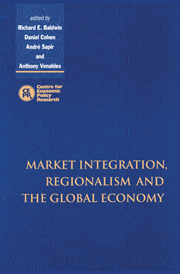Book contents
- Frontmatter
- Contents
- List of figures
- List of tables
- Preface
- Acknowledgements
- List of conference participants
- 1 Introduction
- PART ONE REGIONALISM AND THE GLOBAL ECONOMY
- PART TWO MARKET INTEGRATION AND REGIONALISM
- 7 Operationalising the theory of optimum currency areas
- Discussion
- 8 European migrants: an endangered species?
- Discussion
- 9 Geography and specialisation: industrial belts on a circular plain
- Discussion
- 10 Convergence … an overview
- Discussion
- 11 Convergence as distribution dynamics (with or without growth)
- Discussion
- Index
11 - Convergence as distribution dynamics (with or without growth)
Published online by Cambridge University Press: 24 February 2010
- Frontmatter
- Contents
- List of figures
- List of tables
- Preface
- Acknowledgements
- List of conference participants
- 1 Introduction
- PART ONE REGIONALISM AND THE GLOBAL ECONOMY
- PART TWO MARKET INTEGRATION AND REGIONALISM
- 7 Operationalising the theory of optimum currency areas
- Discussion
- 8 European migrants: an endangered species?
- Discussion
- 9 Geography and specialisation: industrial belts on a circular plain
- Discussion
- 10 Convergence … an overview
- Discussion
- 11 Convergence as distribution dynamics (with or without growth)
- Discussion
- Index
Summary
Introduction
Convergence is a catchy idea, but one that organises serious thinking in areas as diverse as economic growth, theoretical econometrics, finance, European politics and monetary union, regional planning and geography, up through but not ending at entertainment and multi-media technology and the software industry.
Some growth economists define ‘convergence’ as a single economy approaching its theoretically-derived steady-state growth path. Others translate this to whether poor economies are catching up with rich ones. Yet others think of these two – conceptually quite different – statements as being identical, and thus of either indicating convergence.
At one extreme, econometricians and probabilists have found it useful to work with different notions of convergence of sequences of random variables. At a different extreme, economists and policy-makers in Europe have been obsessed with the Maastricht convergence criteria. Finally, when high-tech, fast-growth market participants – people who actually create value in modern economies – get together, they too excitedly discuss convergence, but now between biological and machined products, or between communications, computers and content (e.g. Kelly, 1994; Tapscott, 1996). In every instance, the term ‘convergence’ is used with a different meaning – and rightly so.
That ‘convergence’ suffers from this meaning overload should not disguise its importance. This chapter concerns ‘convergence’ in the sense of poor economies catching up with the rich. If by economies, one means countries, then magnitudes of the numbers alone should already show why convergence is important. Some countries have been doubling per capita incomes every decade; yet others have been stagnant, with levels of per capita income a hundred times lower than those of the leading economies.
- Type
- Chapter
- Information
- Market Integration, Regionalism and the Global Economy , pp. 298 - 328Publisher: Cambridge University PressPrint publication year: 1999
- 1
- Cited by



